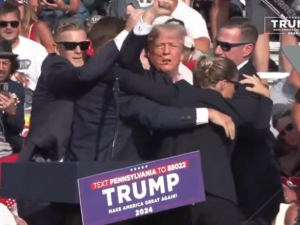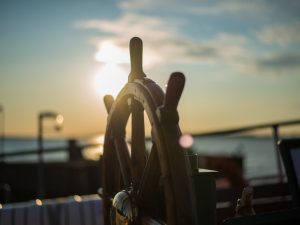Den 5. november 2022 (EIRNS) – Den 5. november indkaldte Executive Intelligence Review (EIR) til en ekstraordinær tre timers pressekonference, der samlede en international gruppe af talere med videnskabelig, militær, efterretningsmæssig og politisk baggrund, alle pligttro til det princip, som præsident Ronald Reagan fastslog i sin Tale om unionens Tilstand i 1984, nemlig at “en atomkrig ikke kan vindes og aldrig må udkæmpes”. I sin tale til både USA’s og Sovjetunionens befolkning tilføjede præsident Reagan: “Den eneste værdi i at vores to nationer besidder atomvåben består i at sikre, at de aldrig vil blive anvendt. Men ville det så ikke være bedre at afskaffe dem helt og holdent?” Naturligvis ville det være bedre. Men 38 år efter denne betydningsfulde udtalelse er Vestens “regeringsskib” blevet kapret af geopolitiske galninge, som hensynsløst styrer os mod en atomkrig, der vil forårsage menneskehedens udslettelse. Kan denne vanvittige proces vendes?
Formålet med denne pressekonference og med tidligere og fremtidige konferencer, som EIR og Schiller Instituttet er værter for, består i at overbevise verden om, at der eksisterer en bevægelse af fornuftige mennesker i Vesten, som ikke blot er imod udryddelseskrig, men som også foreslår positive ideer til at skabe en velstående og harmonisk fremtid for nuværende og kommende generationer. Vil denne bevægelse lykkes? Som mange af talerne gjorde det klart, vil det afhænge af almindelige borgeres vilje til at opgive tilskuerrollen på sidelinjen og deltage i kampen. Nedenfor følger et kort resumé af de indledende betragtninger fra hver enkelt af de talere, der deltog i pressekonferencen.
Her er et fremhævet resumé:
Steven Starr, pensioneret direktør for University of Missouris Clinical Laboratory Science Program og ekspert i atomkrig, gav en skræmmende præsentation, som omfattede et overbevisende lysbilledeshow, hvori han klart påviste, at en atomkrig ville forårsage menneskets og de fleste dyrs udslettelse på planeten Jorden. Han forklarede, at den destruktive kraft, som nutidens atomvåben rummer, langt overgår den effekt, som blev brugt mod Japan under Anden Verdenskrig. Et sprænghoved, der detoneres over New York City, ville skabe en ildstorm, der ville brænde alt til aske i en radius på 150 kvadratkilometer. Hvis et missilangreb mod USA blev opdaget, ville præsidenten få en briefing på 30 sekunder om angrebets art og derefter maksimalt have 2-3 minutter til at beslutte, hvordan der skulle reageres! Hvis der blev beordret et modangreb, ville missilerne være i luften i løbet af to minutter uden mulighed for at trække dem tilbage, hvis advarslen skulle vise sig at være falsk. Følgerne af en atomkrig ville være en atomvinter, hvor 70 % af sollyset ville blive blokeret på den nordlige halvkugle og 35 % på den sydlige halvkugle i en periode på mindst ti år, hvilket ville gøre det umuligt at dyrke afgrøder. Dette ville medføre massiv hungersnød og mulig udryddelse af mennesker og dyr.
Resten er på engelsk
Former U.S. Marine Corps intelligence officer and chief UN weapons inspector Scott Ritter followed with a presentation aimed at shaking people out of their complacency regarding the dangers of nuclear war. He began with the assertion that the majority of American people are ignorant of the reality of nuclear conflict. The son of an Air Force officer stationed in Germany during the Cold War, whose responsibilities included nuclear weapons delivery, Ritter grew up acutely aware that nuclear annihilation could happen at any time. After joining the Marine Corps, he was assigned to a nuclear artillery unit which constantly trained to carry out attacks. He then went on to become a weapons inspector during the 1980s at the height of the dangerous very period where Soviet SS-20 and U.S. Pershing II intermediate missiles could reach targets within seven minutes eliminating any chance for reasoned deliberation on how to respond to an attack. In Ritter’s words, “The 1980’s was all about dodging nuclear Armageddon.” He believes one of the most underappreciated moments in history is when President Reagan signed the INF Treaty with Soviet President Mikhail Gorbachev because this event saved the world from nuclear suicide. However, with the collapse of the Soviet Union we no longer respect Russia and are now reconstituting intermediate nuclear weapons. Ritter ended his presentation as a warning to those in the West who believe a nuclear war against Russia is winnable by describing the Russian system called the “dead hand.” Were a successful decapitation strike carried out against Moscow, the “dead hand” system would automatically launch communications rockets which would travel across the territory of Russia activating a retaliatory second strike which would mean the end of the world.
French Col. Alain Corvez (ret.), former advisor to the General-in-Commander of the UNIFIL in Lebanon and former international relations advisor to the French Foreign Ministry, began his remarks by expressing gratitude for participating in an event where speakers know what they’re talking about. The problem in his opinion is that leaders in the West know nothing about nuclear war. He recounted Charles de Gaulle’s intention to constitute a nuclear force (“force de frappe”) under the sole control of France strictly for the purpose of nuclear deterrence. De Gaulle was well aware that a nuclear war would result in the deaths of hundreds of millions of people. He questioned whether today’s leaders have any understanding of the fact that a nuclear war cannot be won and that as a consequence the nature of war has been fundamentally changed. Even a war with a small nuclear armed power like North Korea would have unimaginable consequences.
Colonel Richard Black (ret.), U.S. Marine Corps combat veteran, former chief of the Army Criminal Law Division at the Pentagon and former Virginia State Senator, began by stating that we are in a footrace with the globalist demons intent on starting World War III. According to Black, given that there may be a shift away from support for the Ukrainian regime were the outcome of the midterm elections to favor the Republicans, as is highly likely, there is an effort by NATO to accelerate the war. As empirical evidence of this accelerated war drive, Black cites events such as the Sept. 26 Nord Stream pipeline sabotage (including British Prime Minister Liz Truss’s “It is done” text message to Secretary of State Tony Blinken), the Oct. 8 attempt at blowing up of the Crimean Bridge across the Kerch Strait and the foiling by Russian security forces of sabotage attempts deep within Russian territory. Black believes the intention is to “trip up” the Russian leadership causing an overreaction which creates the pretext for a counterattack by NATO. He also pointed to the recent highly unusual surfacing of two U.S. nuclear armed attack submarines as an intended signal to Moscow that NATO has the capability to launch a nuclear ’Pearl Harbor” at any time. He stated that President Biden has the capability of ending the war at anytime but right now is not listening to the American people but only to the globalists. Black ended his remarks by voicing his opinion that the Schiller Institute is the preeminent voice for peace in the world today and thanked the young “gutsy” Schiller Institute activists for their interventions confronting the warmongers.
The next speaker, Jacques Cheminade, is a three-time candidate for the French presidency and leader of the Solidarité et Progrès party as well as a leader of the Schiller Institute. Cheminade’s remarks were very brief, expressing his full support for Diane Sare’s Senate campaign in the Nov. 8 U.S. election. What she expresses as her political objectives echoes the voice of people he has met in France who are suffering the same hardships as the American people. She is the only candidate campaigning for peace, stability and cooperation for the entire world. Cheminade advised all New Yorkers to vote for Sare to help bring about peace and the best of all possible worlds.
Dr. Cliff Kiracofe, former senior advisor to the U.S. Senate Foreign Relations Committee and president of the Washington Institute for Peace and Development, began by stating his opinion that a diplomatic process is the only way to end the war in Ukraine and the sooner this diplomatic process takes place the better. Russia, having a policy of what Kiracofe characterized as “old school” diplomacy, is open to negotiations. However, the Ukrainian government at this point is refusing to negotiate, and without negotiations diplomacy is impossible. France and Germany failed to advance the Minsk II process which was endorsed by the UN Security Council in 2015. As a consequence Ukraine has lost the Donbass territory (formerly known as Novorossiya) which has been incorporated into Russia. The question now is will Russia launch a winter offensive to absorb more territory and would this lead to a general European war or even nuclear war? Kiracofe ended by stating his belief that as peace advocates we must insist on a diplomatic process now.
General Dominique Delawarde (ret.), former French liaison officer to the U.S. Army’s Command and General Staff College at Fort Leavenworth, Kansas, began by thanking Scott Ritter for his exemplary work which is followed very closely by his colleagues in France. He also stated that as a citizen of the world he endorses Diane Sare’s Senate campaign; that she is a rare candidate who understands that Russia cannot afford to lose the war with Ukraine and that miscalculations would have potential catastrophic consequences. He expressed his fear that the globalists in the West directing foreign policy unless stopped are leading us to war. He ended his remarks by noting that Sare deserves to be Senator as she represents a powerful voice for peace and, as in 1962 during the Cuban Missile Crisis, we must be willing to compromise.
Retired CIA analyst Ray McGovern started by recounting his experience as a 2nd Lieutenant in the U.S. Army during the Cuban Missile Crisis at which time he was stationed near Key West, Florida. He then amplified remarks made earlier by Scott Ritter regarding how close we came to nuclear war with the Soviet Union, a nation President Reagan had labeled “the evil empire,” in 1983. In particular, McGovern singled out a NATO exercise in 1983 called Able Archer which simulated a nuclear attack against the Soviet Union. At the time serving as a CIA intelligence officer, a colleague named Mel Goodman sounded the alarm bells to his superiors that the Soviets saw this exercise as a serious threat and if we didn’t “tone it down” it could trigger a nuclear war. Whereas Bob Gates refused to heed his warnings, he went over Gates’s head to William Casey, who did listen to him seriously, to our great fortune. The problem now in the current political climate is that very few people know what’s really going on. That means those who do know have to “get off their butts and do something.” McGovern then explained what he calls the Noah principle: “No awards for predicting rain, awards only for building arcs.” This means each person has to get off their derriere and do their part in helping to building the arc (i.e. do something!). And although we can’t expect immediate success, by being faithful and telling the truth we set an example for future generations. McGovern ended his remarks by calling out the older generation with a “little bit of gray” in their hair. According to McGovern these people have an advantage because while the actions of younger people may be dismissed by the general population when they get arrested or beaten up, most people don’t like to see old people getting beaten up. Under today’s circumstances it’s important for older people to put this advantage to good use and get out there and do something!
The final speaker was Helga Zepp-LaRouche, founder and chairwoman of the Schiller Institute. Echoing several of the prior speakers, she started by saying that we are in the most dangerous moment in history and most people know nothing. During the 1980s, during the Pershing Missile crisis, hundreds of thousands of people were in the streets protesting. Today very little is happening. Her late husband, Lyndon LaRouche, created the basis for a new security architecture during that period based on a policy that became known as the Strategic Defense Initiative which was formally adopted by President Reagan on March 23, 1983. With the ongoing collapse of the trans-Atlantic financial system, to prevent World War III we need a new security architecture which takes into consideration the needs of all nations. To succeed, the West must be a part of this new security architecture. She expressed her belief that the reason she is on the Ukraine government’s Center for Countering Disinformation “hit list” is precisely because of the role the Schiller Instituting is playing in this process. Zepp-LaRouche ended her remarks by wholeheartedly wishing Diane Sare success in her Senate campaign.







